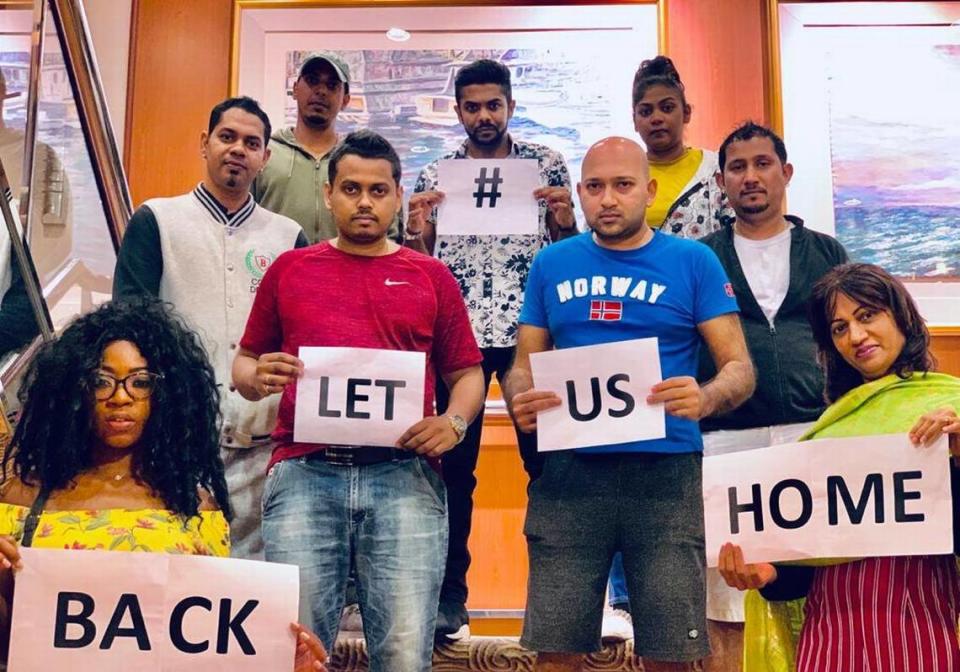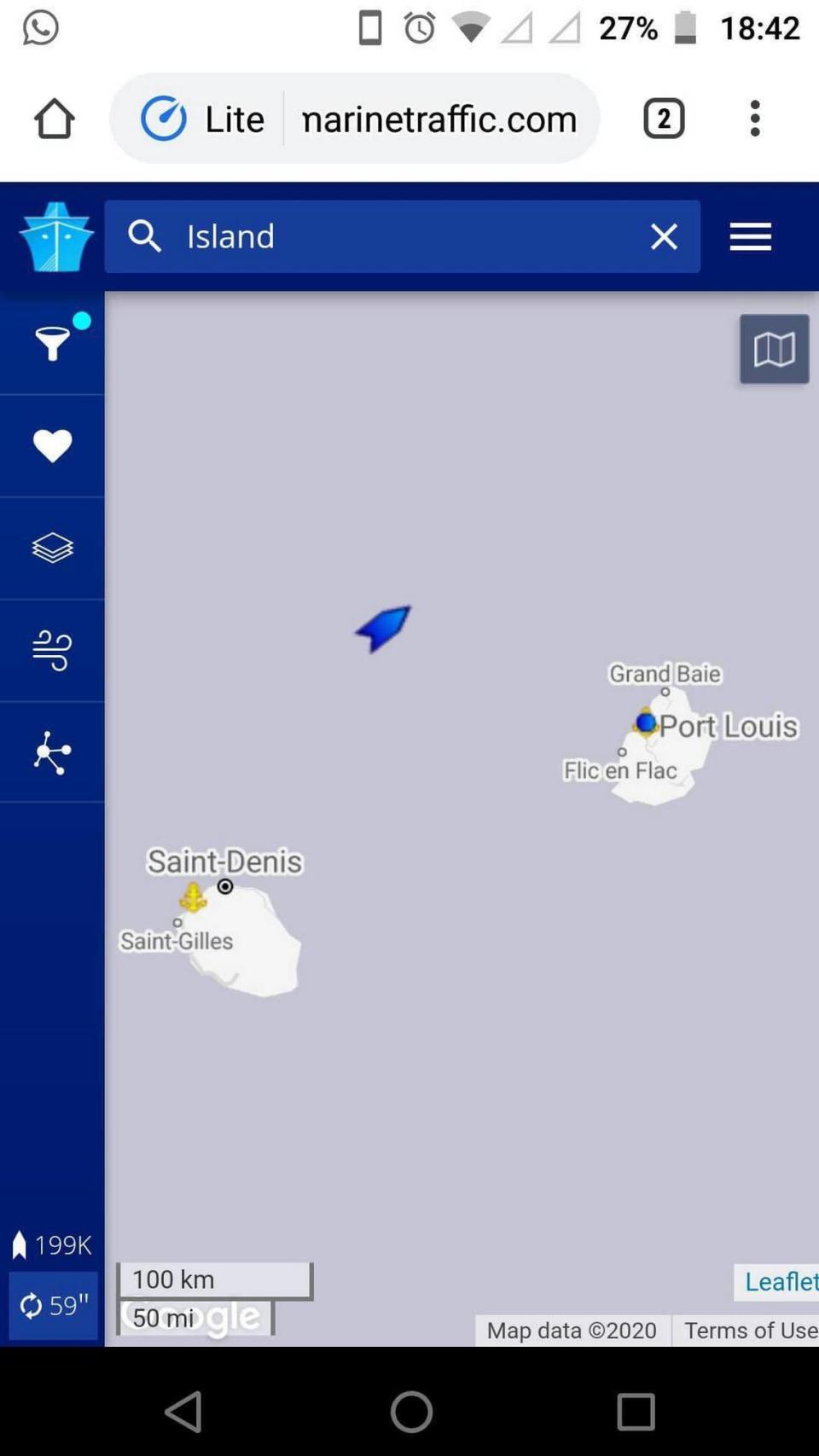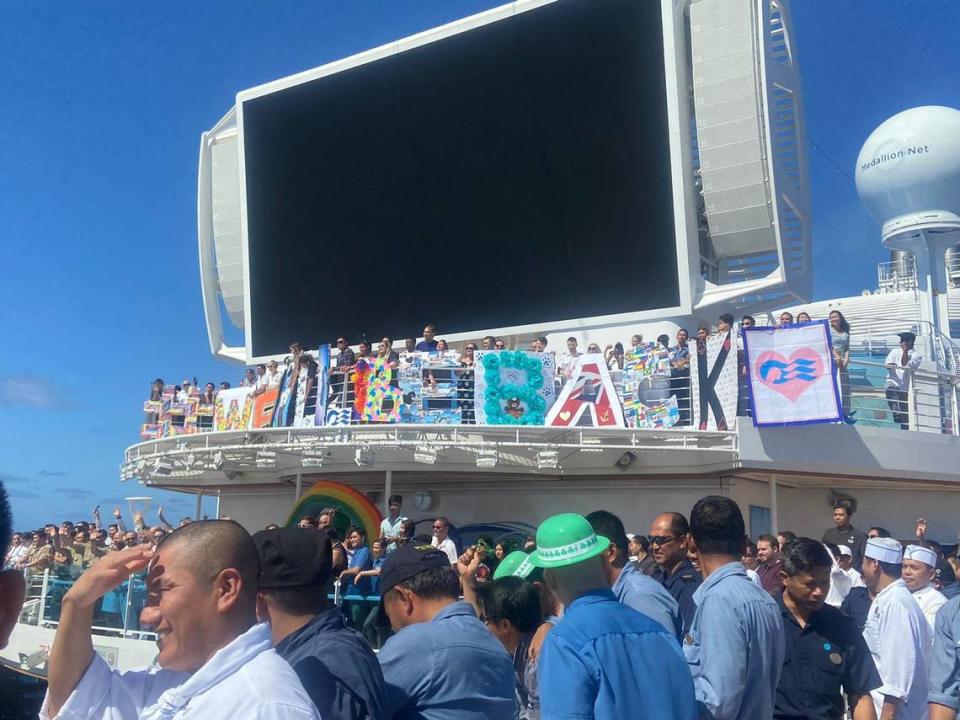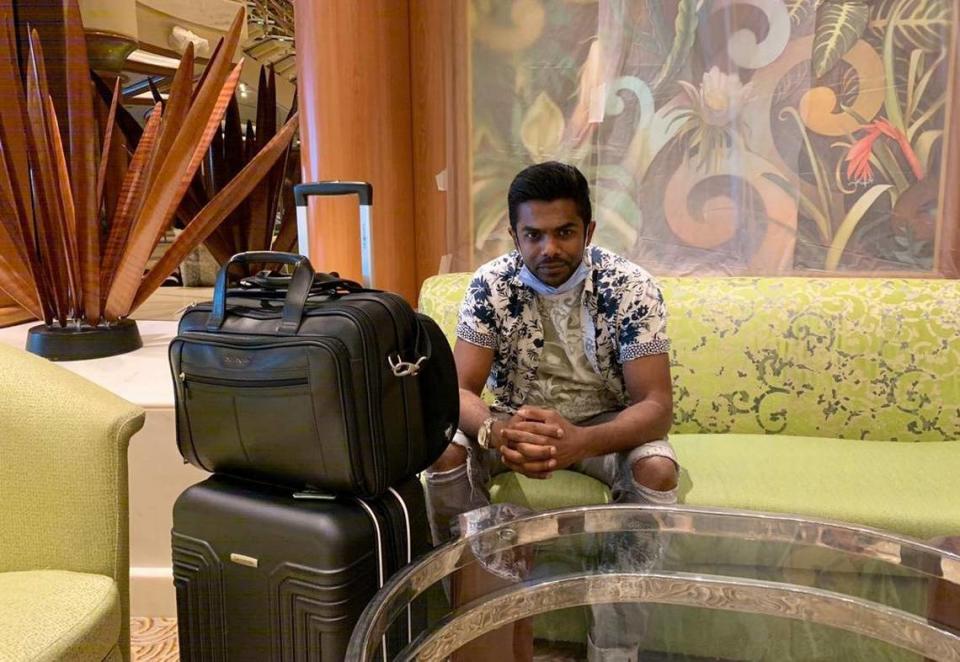Stranded at sea: Crew members weigh COVID-19 trauma as they decide whether to return
Princess Cruises crew member Gan Sungaralingum has spent the last two months taking care of his elderly parents, eating home- cooked meals, and doing what he loves most: walking on the beach near his home in Mauritius. But instead of returning to his position as an onboard watch salesman after a few months of rest at home, he’s leaving the industry.
“Maybe I’ll come back as a passenger, but not as a crew,” he said. He’s been a crew member with several cruise lines since 2014.
Sungaralingum is part of a growing number of cruise ship workers who say they will not be returning to their posts when cruises resume. Thousands, like Sungaralingum, suffered several months stranded at sea without pay after the industry shut down in mid-March amid COVID-19 outbreaks on several ships. The virus hit crew members particularly hard as cruise companies struggled to contain outbreaks even long after passengers departed. At least 1,779 crew members contracted COVID-19 and at least 29 died from the virus, according to a Miami Herald investigation.
Sungaralingum was at sea for more than five-and-a-half months; more than two dozen crew members from other companies are still waiting to go home. Travel restrictions from the U.S. Centers for Disease Control and Prevention and various international governments complicated efforts to repatriate crew members, making it both expensive and logistically challenging.
In the Caribbean, many islands required company-sponsored land quarantines for crew members before they could return home to their families. Mauritius required the same, and only allowed for a few hundred workers to return home each month.

Spokesperson for Carnival Corporation Roger Frizzell said the company has repatriated every crew member who wanted to return home. Spokesperson for Royal Caribbean Group Jonathon Fishman said that 30 crew members from Vietnam and Trinidad and Tobago are still waiting to go home. Spokespeople for Norwegian Cruise Line Holdings and MSC Cruises did not respond to requests for comment about the number of crew on their ships still waiting to go home.
Some at sea for more than a year have described extreme distress, including suicidal thoughts.
“It’s too much, one year is too much,” said one crew member who requested anonymity for fear of retaliation. “It’s very disappointing to see how they think about the business, and they don’t think about the people who haven’t gone home. There is a point when you can feel the pressure so much that you really need to get out. I am trying to concentrate as best as I can, but I see it in everybody, stressed about everything.”
Sungaralingum’s 170-day odyssey was documented through video interviews with the Miami Herald and video he captured. It spanned five continents, three cruise ships, three on-board quarantines, and three flights, before he finally made it home to Mauritius in late August.
Months before, in May, the cruise ship carrying him and several other Mauritians passed just 50 miles from his island nation, nearly close enough for Sungaralingum to see home from his window. The country’s supreme court denied his emergency request to dock, and he remained at sea for three more months.

The uncertainty as to when — or if — he would make it home caused his hair to fall out as he battled depression, he said.
Other long-trapped crew members said they too felt traumatized and wonder whether they should return to work at sea.
“After this experience, I doubt it,” a Celebrity Cruises crew member from the Dominican Republic recently told the Miami Herald, requesting anonymity for fear of retaliation from the company. “It was a traumatic experience being on the ship for so long, locked in a cabin and not knowing when you would leave the ship.”
For others, the decision is more complicated. With the virus still surging in many parts of the world, unemployment remains high, and cruise ships, once they’re operating again, offer a rare chance at a stable job.
An engineer for Royal Caribbean who was stuck at sea without pay for nearly a month is scheduled to return to work on a ship before the end of the year, but he hopes he can find a land-based job in his home country before then. He fears getting stuck away from his wife and young child without a paycheck again. He requested anonymity for fear of retaliation from the company.

“I’m doing all the best to find any opening position in my country to not return back,” he said. “As last chance I have to go back on Royal Caribbean to maintain my family economically well.”
Companies have canceled U.S. cruises until at least Jan. 1 as they prepare to revamp their ships and protocols to better protect passengers and crew from the virus. The CDC lifted its cruise ban this month but put in its place a slew of new requirements companies will have to meet before they can welcome passengers again.
Some of those requirements are targeted specifically at crew. Cruise companies must test crew members for COVID-19 using PCR tests weekly and report the results to the CDC. The agency’s requirements put in place over the summer to help companies better manage crew outbreaks will remain in effect, including mask mandates and individual cabins.
One Royal Caribbean crew member from South Africa told the Herald he is encouraged by the new CDC rules. He’s eager to get back to work because he misses traveling but said he told the company he is not comfortable returning before mid-2021. He won’t return unless crew are in individual cabins and are able to get off the ships in ports, he told the Herald.
“I would like to know from front-to-back what to expect,” he said. “For mental well-being it’s crucial. Last thing is to crack up and be stranded in a way all over again.”

Hugo Bray, 46, a shore excursion manager for Princess Cruises, said he is confident that with the proper training, crew members can stay safe from the virus. Crew members already receive training about preventing another common disease, norovirus, from spreading on board, he said, and in his experience, that training has been effective. Norovirus is not deadly for most people.
But the prospect of limited passenger capacity, something cruise companies have pledged to do, has him worried about his wages. If there are fewer passengers taking shore excursions, that will affect his commission.
“It’s more work for less money — not an attractive situation,” he said.
The crew repatriation crisis underscored the vulnerability of the industry’s workforce. In one of the worst situations, Bahamas Paradise Cruise Line forced crew to continue working on board its ships without pay for five months. Carnival Corporation, Royal Caribbean and Norwegian Cruise Line Holdings stopped paying non-working crew and charged them for basic necessities like soap, snacks and sometimes WiFi.
The seafarers have little recourse. U.S. labor laws do not apply to cruise ship workers as the companies and ships are registered abroad. The International Labor Organization, an arm of the United Nations, recommended that cruise companies pay crew members at least sick wages during the COVID-19 pandemic, whether the crew are quarantined on land or on a ship.

The United Nations’ Maritime Labor Convention of 2006, the only labor protections in place for seafarers, says “the maximum duration of service periods on board following which a seafarer is entitled to repatriation [should be] less than 12 months.” Ninety-seven countries have ratified the MLC to enforce its crew welfare rules. The United States is not one of them.
While stuck on board, Sungaralingum became an advocate for crew members by petitioning governments to allow ships to dock and giving interviews to local radio stations about his experience. He hopes the COVID-19 pandemic will change how the industry and governments treat crew members.
“Every human is human, whether it’s a passenger or a crew member,” he said. “The crew have paid a heavy price.”

